
Amitabh Bachchan is an Indian actor who works in Hindi cinema. With a cinematic career spanning over five decades, he has played pivotal roles in over 200 films. Widely recognised as one of the greatest actors of all time, he is considered to be amongst the most accomplished and influential actors in the history of Indian cinema. Bachchan is often hailed as the Shahenshah of Bollywood, Sadi Ke Mahanayak, Star of the Millennium, or simply Big B. His dominance in the Indian film industry during the 1970s–80s led the French director François Truffaut to describe it as a "one-man industry".

Hindi cinema, popularly known as Bollywood and formerly as Bombay cinema, refers to the film industry based in Mumbai, engaged in production of motion pictures in Hindi language. The popular term Bollywood is a portmanteau of "Bombay" and "Hollywood". The industry is a part of the larger Indian cinema, which also includes South Indian cinema and other smaller film industries.

Ashok Kumar, was an Indian actor who attained iconic status in Indian cinema. He was considered the first big star of Hindi cinema as well as the first lead actor to play an anti-hero. He also became the first star to reinvent himself, enjoying a long and hugely successful career as a character actor. He was a member of the cinematic Ganguly family. He was honoured in 1988 with the Dadasaheb Phalke Award, the highest national award for cinema artists, by the Government of India. He also received the Padma Bhushan in 1999 for his contributions to Indian cinema.

Dev Anand was an Indian actor, writer, director and producer known for his work in Hindi cinema. Anand is considered as one of the greatest and most successful actors in the history of Indian cinema. Through a career that spanned over six decades, he worked in more than 100 films. Anand is a recipient of four Filmfare Awards, including two for Best Actor. The Government of India honoured him with Padma Bhushan, Indian third highest civilian honour in 2001 and with Dadasaheb Phalke Award in 2002.
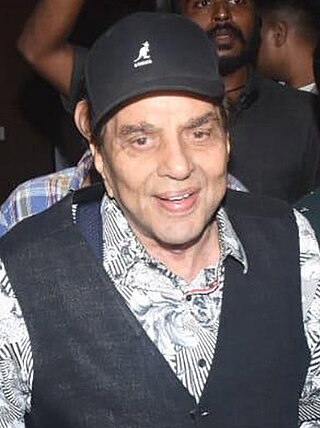
Dharmendra Kewal Krishan Deol is an Indian actor, producer, and politician who is primarily known for his work in Hindi films. Nicknamed the "He-Man" of Bollywood, Dharmendra is widely regarded to be amongst the most handsome Indian actors of his time. In 2012, he received the Padma Bhushan, India's third highest civilian honour, from the Government of India. Dharmendra has worked in over 300 films in a career spanning over six decades. He is considered one of the most successful actors in the history of Hindi cinema.
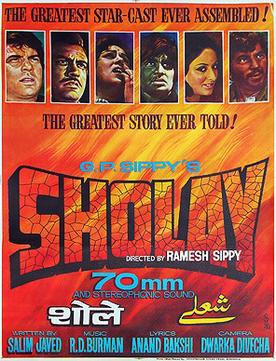
Sholay is a 1975 Indian Hindi-language action-adventure film directed by Ramesh Sippy, produced by his father G. P. Sippy, and written by Salim–Javed. The film is about two criminals, Veeru (Dharmendra) and Jai, hired by a retired police officer to capture the ruthless dacoit Gabbar Singh. Hema Malini and Jaya Bhaduri also star, as Veeru and Jai's love interests, Basanti and Radha, respectively. The music was composed by R D Burman.

Deewaar is a 1975 Indian Hindi-language action crime film written by Salim–Javed and directed by Yash Chopra. The film stars an ensemble cast of Amitabh Bachchan, Shashi Kapoor, Neetu Singh, Nirupa Roy, Parveen Babi, Iftekhar, Madan Puri, Satyen Kappu and Manmohan Krishna. The music was composed by R. D. Burman. The film tells the story of a pair of impoverished brothers who struggle to survive in the slums of Mumbai, and eventually find themselves on opposing sides of the law. The title Deewaar ("wall") signifies the wall that has sprung up between the two brothers, drawn apart by fate and circumstances in a time of socio-political turmoil.
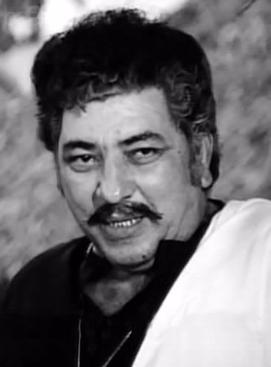
Amjad Khan was an Indian actor and film director.
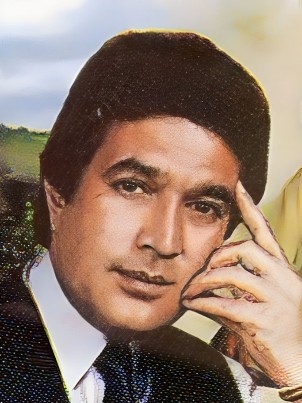
Rajesh Khanna was an Indian actor, film producer and politician who worked in Hindi films. Considered as one of the greatest and most successful actors in the history of Indian cinema, he is known as the first Superstar of Indian cinema. His accolades include five Filmfare Awards, and in 2013, he was posthumously awarded the Padma Bhushan, India's third highest civilian honour.

Hum Aapke Hain Koun..! also known by the initialism HAHK, is a 1994 Indian Hindi-language musical romantic drama film written and directed by Sooraj Barjatya and produced by Rajshri Productions. The film stars Madhuri Dixit and Salman Khan and celebrates Indian wedding traditions by means of a story of a married couple and the relationship between their families; a story about sacrificing one's love for one's family. The basic plot is based on studio's earlier film Nadiya Ke Paar (1982), which was based on Keshav Prasad Mishra's Hindi novel Kohbar Ki Shart. The film features music by Raamlaxman who also composed a 14-song soundtrack, an unusually large number of songs for that period.

Salim Abdul Rashid Khan is an Indian actor, film producer and screenwriter. He wrote the screenplays, stories and scripts for numerous Bollywood films. Khan is one half of the prolific screenwriting duo of Salim–Javed, along with Javed Akhtar. The duo were among the first Indian screenwriters to achieve star status in Hindi cinema, and became the most successful Indian screenwriters of all time. While working together, Salim Khan was largely responsible for developing the stories and characters, whereas Javed Akhtar was largely responsible for developing the dialogues.

Salim–Javed were an Indian screenwriting duo, composed of Salim Khan and Javed Akhtar, who worked primarily in Hindi cinema. They were among the first Indian screenwriters to achieve star status, and are regarded as among "Hindi cinema's greatest screenwriters". They worked together on 24 films between 1971 and 1987, of which 20 were commercially and critically successful.
Gopaldas Parmanand Sipahimalani, better known as G. P. Sippy, was an Indian film producer and director who worked in the Bollywood industry.
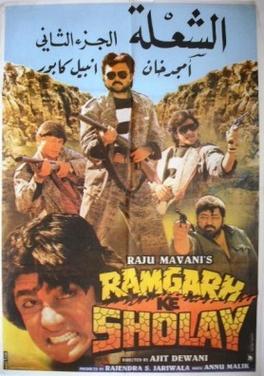
Ramgarh Ke Sholay is a 1991 Indian Hindi-language parody film directed by Ajit Dewani, starring Vijay Saxena, Kishore Bhanushali and Amjad Khan. The film parodies the 1975 film Sholay

Dev Anand, was an Indian actor, writer, director and producer known for his work in Hindi cinema. Anand is considered one of the greatest and most successful actors in the history of Indian cinema. Through a career that spanned over six decades, he worked in more than 100 films. Anand is a recipient of four Filmfare Awards, including two for Best Actor. The Government of India honored him with Padma Bhushan, Indian third highest civilian honour in 2001 and with Dadasaheb Phalke Award in 2002.
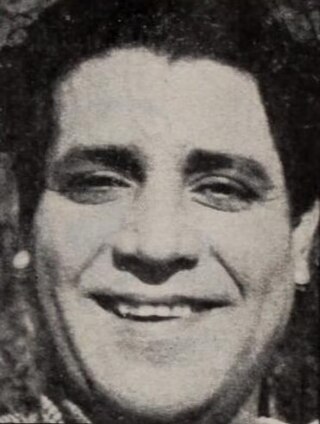
Agha was an Indian actor of Bollywood films. He was known for comic roles and modeled himself on Bob Hope's style of acting. He appeared in over 300 Hindi films in his career between 1935 and 1986. His son, Jalal Agha, also became an actor, mostly known for the song Mehbooba Mehbooba in Sholay (1975).

Amitabh Bachchan is an Indian actor, occasional playback singer, film producer, television host and former politician who primarily works in Hindi films. He made his acting debut in 1969 with Saat Hindustani, and narrated Mrinal Sen's Bhuvan Shome (1969). He later appeared as Dr. Bhaskar Banerjee in Hrishikesh Mukherjee's Anand (1971), for which he won the Filmfare Award for Best Supporting Actor. In 1973, Bachchan played the role of Inspector Vijay Khanna in Prakash Mehra's action film Zanjeer. He has since appeared in several films with the character name "Vijay". During the same year, he appeared in Abhimaan and Namak Haraam. For the latter, he received the Filmfare Award for Best Supporting Actor. Two years later he appeared along with Shashi Kapoor, in Yash Chopra's Deewaar, which earned him the Filmfare Award for Best Actor nomination. He was caited as the "angry young man" for his roles in Deewaar and Zanjeer. Later he starred in Ramesh Sippy's Sholay (1975), which is considered to be one of the greatest Indian films of all time. After appearing in the romantic drama Kabhie Kabhie (1976), Bachchan starred in Manmohan Desai's action comedy Amar Akbar Anthony (1977). He won the Filmfare Award for Best Actor for his performance in the latter. He then played dual roles of Don and Vijay in Don (1978), which again earned him the Filmfare Best Actor Award for the consecutive year.
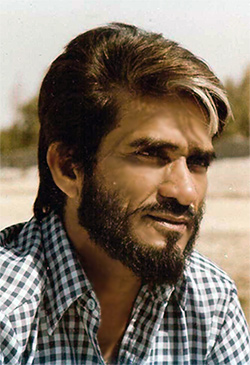
Mohan Makijany (24 April 1938 – 10 May 2010), popularly known as Mac Mohan, was an Indian actor, who worked in Hindi cinema. He was known for his villainous roles in films throughout the 1970s and 1980s. He appeared in over 200 films, including Don, Karz, Satte Pe Satta, Zanjeer, Rafoo Chakkar, Shaan, Khoon Pasina, and Sholay.
Main Tere Liye is a 1988 Indian Bollywood film directed by Vijay Anand and produced by Dev Anand. It stars Rajendra Kumar, Asha Parekh, Suneil Anand, Meenakshi Seshadri in lead roles.
Kishore Bhanushali is an Indian actor and stand-up comedian notable for his works in Hindi films and television serials. He has a likeness to late Bollywood actor Dev Anand. He had the main lead in many films like Hum Hain Khalnayak, Jai Maa Karwa Chauth, and also a central role in Ramgarh Ke Sholay.
















